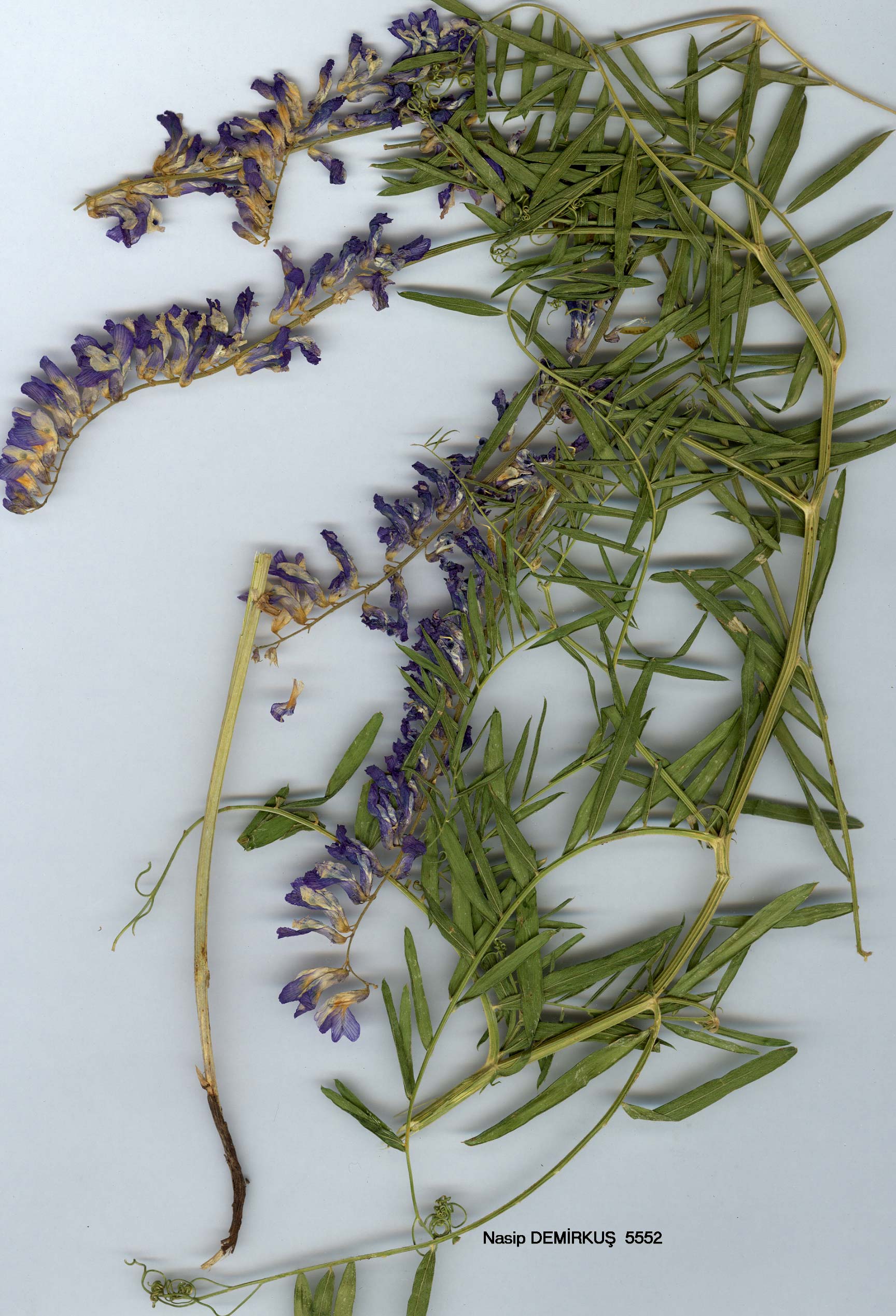| Fabaceae |
|---|

Vicia villosa ROTH subsp villosa ROTH |
 Vicia villosa ROTH subsp villosa ROTH |
 Vicia villosa ROTH subsp villosa ROTH |
Vicia L. |
| V. villosa Roth, Tent. Fl. Germ. 2:182 (1795). Annual or biennial, villous or adpressed-pilose to almost glabrous, 15-9O(-12O) cm, climbing or procumbent. Leaflets 4-10-paired, 0.3-3.5 cm, oblong-ovate to narrowly linear; stipules semi-hastate or sagittate to lanceolate; tendrils branched. Peduncle as long as the leaf or shorter, 3-40-flowered. Pedicels l-2(-3) mm. Flowers 12-22 mm, violet-blue or ± blue. Calyx 5-8 mm, strongly gibbous, with an oblique mouth, villous to sparsely pilose-pubescent; teeth shorter to longer than tube, narrowly subulate to lanceolate-triangular, ciliate or glabrescent. Limb of standard | to nearly as long as the claw; keel navicular. Style laterally subcompressed. Legumes oblong or oblong-rhomboid. (l.5-)2-3(-3.5) × (0.5-)0.6-1(1.2) cm, glabrous or pubescent. Seeds (l-)2-8, hilum 1/6-1/12 of perimeter. A very polymorphic species. Four overlapping subspecies (as recognised in Fl. Eur. 2:132) occur in our area; the taxonomic situation is particularly puzzling in W. Anatolia and the neighbouring islands. 1. Stems ± villous; leaflets usually 7-10-paired, elongate, never obtuse; stipules up to 5 mm broad: raceme 10-30-flowered; lower calyx tooth at least as long as tube, ciliate; limb of standard at least f as long as claw; legume glabrous subsp. villosa 1. Stems glabrescent or adpressed-pilose; leaflets 4-10-paired; stipules less than 3 mm broad: racemes (3-)5-15-flowered; lower calyx tooth generally shorter than tube, usually subglabrous; limb of standard 1/2 as long or nearly as long as claw: legume glabrous or pubescent 2. Leaflets linear-oblong, (4-)6-10-paired, some often longer than 17 mm; raceme 5-15-flowered; standard violet, limb 1/2-2/3 as long as claw 3. Ovary and mature legume glabrous subsp. dasycarpa 3. Ovary and legume persistently pubescent subsp. eriocarpa 2. Leaflets ± elliptic, 4-7-paired, shorter than 17 mm; raceme 3-7-flowered, lax; corolla 14-22 mm, ± blue, often yellow-tinged, standard at least § as long as claw (legume glabrous or pubescent) subsp. microphylla subsp. villosa. Figure 3, p. 323. Syn: V. reuteriana Boiss. & Buhse, Aufz. 73 (1860). Ic: Reichb., Ic. Fl. Germ. 22: t. 234 (1903); Guinea, op. cit. 119, t (1953). 2n = 14. Fl. (l-)3-7. Rocky places, fields (most commonly), banks, damp places, 3-1700 m. Described from Vegesak in Germany. Widespread. 'Kurdistan', 1840, Strangways! A1(E) Tekirdağ to Malkara, 3-50 m, Dudley, D. 34558! A2(E) Istanbul: Kağithane, 11 vi 1917, Azn.! A2(A) Istanbul: Polonezköy, 29 vi 1940, B. Post! A4 Kastamonu: d. Tosya, Karadere to Devrende, Sint. 1892:4574! A8 Erzurum: Tortum, 1650 m, D. 47496 (and cult. Edinb.)! B7 Erzincan: N of Pülümür, Orshan & Plitmann 4173! B8 Bingöl: Muş to Erzurum, Kotschy 822! B9 Van: Van, Maunsell! C1 Muğla: Selimiye, 170 m, D. 40731a! C3 Antalya: Hafis Paşa, 800 m, Tengwall 735! C5 Adana: Adana to Ceyhan, 20 m, D. 42257! C6 Hatay: Iskenderun to Antakya, nr. Amik G., D. 27155! C8 Siirt: Botan Çay, 19 km from Siirt, 400 m, D. 43231! Mainly C. & S. Europe, C. & S. Russia, Crimea, S.W. Asia, frequently cultivated. Intermediates occur between subsp. villosa and subsp. dasycarpa in Turkey, e.g.: A2(A) Istanbul: Kartal to Yakacik, 12 v 1895, Azn.! + We are indebted to R. D. Meikle (Kew), for his opinion on the identity and status of much of the material of V. villosa treated here, |